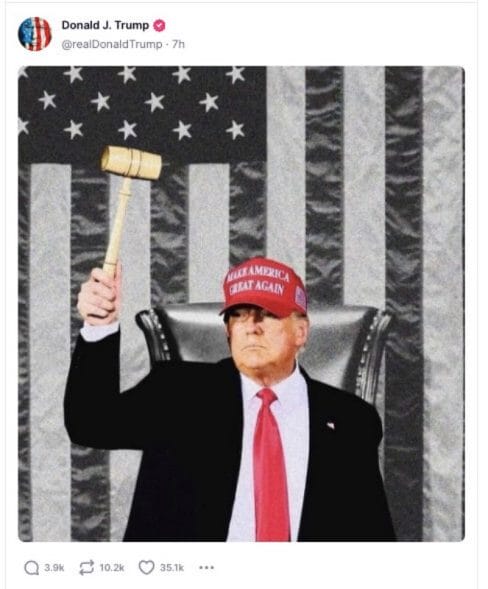Just when you thought the political arena couldn’t get any more electrifying, former U.S. President Donald Trump drops a bombshell, albeit a cryptic one. A single photo of Trump holding the gavel of the U.S. House of Representatives has set the rumor mill ablaze, sparking intense speculation about his potential bid for the recently vacated Speaker of the House position. The move comes on the heels of Kevin McCarthy’s ousting, initiated by Rep. Matt Gaetz of Florida.
With the House in recess and the Speaker’s chair empty, the stage is set for a political showdown that could redefine the power dynamics in Washington. As investors, entrepreneurs, and political aficionados, we can’t afford to ignore the implications of this unfolding drama. It’s not just about who holds the gavel; it’s about the future trajectory of legislative priorities that could impact the financial markets, the tech sector, and the startup ecosystem.

The Photo That Launched a Thousand Theories
Donald Trump is no stranger to the art of generating buzz, and his latest move is a masterstroke in political theater. By posting a photo of himself holding the House gavel on the Truth Social platform, he’s left the interpretation wide open. The absence of any descriptive text accompanying the image has only fueled the fire of speculation. It’s a classic Trump maneuver: say little, imply much, and let the public imagination run wild.
While some may dismiss this as mere posturing, the timing of the photo is telling. It comes right after the removal of Kevin McCarthy from the Speaker’s role, creating a vacuum in the House leadership. The photo serves as a Rorschach test for the American public, revealing deep divisions and hopes about what a Trump-led House could mean for the country.
For investors, this uncertainty could lead to market volatility. A Trump Speakership would likely prioritize different legislative agendas, potentially impacting sectors like tech and healthcare. It’s crucial to keep a close eye on how this narrative develops, as it could offer investment opportunities or necessitate strategic shifts.
Far-Right Republicans Rally Behind Trump
It didn’t take long for far-right Republicans to seize the opportunity presented by Trump’s suggestive post. Proposing him as a potential replacement for McCarthy, they’ve reignited the debate about the direction of the Republican Party. The party’s far-right faction sees Trump as the figurehead who can steer the GOP back to what they consider its core values.
Sean Hannity of Fox News further stirred the pot by revealing that his “sources” suggest Trump might be open to serving as Speaker on a temporary basis. This adds another layer of complexity to the unfolding scenario. A temporary Trump Speakership could serve as a testing ground for his influence over the party and the legislative process.
For entrepreneurs, especially those in the tech sector, a Trump-led House could mean a shift in focus toward deregulation and pro-business policies. However, it could also bring increased scrutiny to Big Tech, an issue that Trump has been vocal about. Navigating this potential change in the political landscape will require agility and foresight.
Trump’s Own Words: A Calculated Ambiguity
When questioned about the Speaker role, Trump’s response was characteristically enigmatic. Speaking to the press in New York, he stated, “A lot of people have been calling me about the speaker. All I can say is we will do whatever is best for the country and the Republican Party and people.” This calculated ambiguity keeps him in the spotlight without committing to a specific course of action.
Trump’s non-committal stance serves multiple purposes. It keeps his options open, allows him to gauge public and party reaction, and maintains his relevance in the political discourse. It’s a strategic move that keeps everyone guessing, including potential rivals for the Speaker position like Rep. Steve Scalise of Louisiana and Rep. Jim Jordan of Ohio.
From a financial perspective, Trump’s potential entry into the House leadership could be a game-changer. His policies have historically been market-friendly but unpredictable. Investors should prepare for a range of scenarios, including shifts in trade policy and tax reforms that could affect corporate profitability.
FAQs
1. Can a former President become the Speaker of the House?
Yes, the U.S. Constitution does not specify that the Speaker of the House must be a current member of Congress, making it legally possible for a former President to assume the role.
2. What are the implications for the stock market if Trump becomes Speaker?
While it’s difficult to predict with certainty, a Trump Speakership could lead to market volatility due to shifts in legislative priorities. Investors should be prepared for both opportunities and risks.
3. How would a Trump-led House impact the tech sector?
A Trump-led House could focus on deregulation and pro-business policies but might also bring increased scrutiny to Big Tech, affecting investment strategies in the sector.
4. What does Trump’s ambiguity mean for the Republican Party?
Trump’s calculated ambiguity keeps him in the political spotlight and allows him to gauge public and party reaction, potentially influencing the direction of the Republican Party.
Conclusion
The political landscape is in a state of flux, and Donald Trump’s cryptic photo has added fuel to the fire. Whether he’s genuinely eyeing the Speaker’s chair or simply enjoying the attention, the implications are far-reaching. For investors, entrepreneurs, and anyone keen on the intersections of politics, finance, and technology, these are times that demand close attention and strategic thinking.
As the House reconvenes next week, all eyes will be on who takes up the gavel. Will it be Trump, or will another contender rise to the occasion? Either way, the decisions made in the coming weeks could have a ripple effect across various sectors, shaping opportunities and risks alike. Buckle up; we’re in for a wild ride.
















